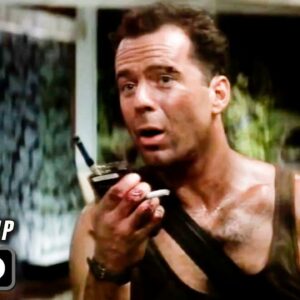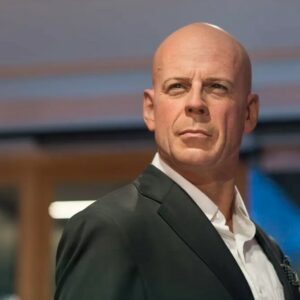In the sprawling tapestry of Hollywood legends, Bruce Willis stands out not just for his rugged charm or his knack for delivering one-liners with impeccable timing, but for the unconventional path that led him to the silver screen’s brightest heights. To understand the man behind the Die Hard persona, we must rewind to his origins—a journey marked by humble beginnings, relentless ambition, and a serendipitous leap from the mundane to the magnificent.
Humble Origins and the Birth of a Dream
Bruce Willis was born on March 19, 1955, in the picturesque town of Idar-Oberstein, Germany. His birthplace, a detail that might seem trivial amidst tales of blockbuster successes, actually underscores the international and somewhat transient nature of his early life. Born to an American father, David Willis, and a German mother, Marlene, Bruce’s childhood was a blend of cultures and experiences that would later inform his versatile acting prowess.
At a tender age, Bruce’s family relocated to the United States, settling in the suburban expanses of Penns Grove, New Jersey. It was here, amidst the ordinary backdrop of American life, that Bruce’s passion for acting began to simmer. Unlike many of his contemporaries who might have stumbled upon acting through theater groups or acting schools, Bruce’s initiation was more grassroots. During his school years, he immersed himself in various school plays, not necessarily as the star but as a fervent participant hungry for the spotlight.
These formative years were not without their challenges. Bruce grappled with the typical struggles of adolescence—identity, belonging, and the perennial quest for purpose. However, his engagement with acting provided a sanctuary, a stage upon which he could explore and express the multifaceted facets of his personality. It was more than just an extracurricular activity; it was the seed that would one day sprout into a full-blown career.
The Grind: From Bartender to Broadway Aspirations
While his passion for acting burned bright, the path was anything but smooth. Bruce’s early adulthood was characterized by a series of odd jobs, each one a stepping stone, albeit a modest one, towards his ultimate goal. Most notably, he worked as a bartender—a role that, while seemingly mundane, offered him a unique vantage point into the human condition. Behind the bar, Bruce encountered a diverse array of personalities, each with their own stories, struggles, and dreams. These interactions, often informal and unfiltered, became inadvertent acting workshops, honing his ability to read people, improvise, and react—a skill set that would prove invaluable in his later roles.
This period was also marked by introspection and self-discovery. Bruce attended Montclair State University, where he majored in drama, further cementing his commitment to the craft. College life, however, wasn’t a panacea for the uncertainties that lingered. The decision to pursue acting was fraught with doubts and financial constraints, leading Bruce to oscillate between his academic pursuits and the pragmatic need to make ends meet. Yet, through it all, his dedication never wavered. Every gig, every role, no matter how small, was a step towards the elusive dream of stardom.
Breaking Through: The Moonlighting Era
The mid-1980s marked a pivotal turning point in Bruce Willis’s career. In 1985, he landed a role that would not only elevate his status in Hollywood but also redefine the archetype of the leading man. Enter “Moonlighting,” a television series that blended drama with comedy in a way that was both fresh and groundbreaking for its time.
Bruce was cast as David Addison, a wisecracking private investigator whose charm and wit became the heartbeat of the show. Unlike the stoic heroes that populated the screens of the era, David Addison was vibrant, erratic, and unabashedly charismatic. This role was a departure from Bruce’s previous work, showcasing a versatility that surprised both audiences and critics alike.
“Moonlighting” was more than just a TV show; it was a cultural phenomenon. It broke conventions with its meta-humor, fourth-wall-breaking dialogues, and the palpable chemistry between Bruce and co-star Cybill Shepherd. The series didn’t just entertain; it engaged, challenging the norms of television storytelling. For Bruce, this was a baptism by fire into the limelight of mainstream entertainment.
The impact of his performance was immediate and profound. Bruce Willis received a Golden Globe Award for Best Actor in a Television Series Musical or Comedy, cementing his place as a household name. The show, despite its eventual cancellation, left an indelible mark on television, and Bruce’s role within it became a testament to his ability to captivate and connect with audiences.
Transitioning to the Big Screen: Navigating the Hollywood Labyrinth
With the success of “Moonlighting” under his belt, Bruce Willis faced the quintessential dilemma of many television stars: the transition to film. Hollywood, with its sprawling studios and myriad opportunities, beckoned, but the path was fraught with uncertainty. Many of his contemporaries who made the jump found themselves typecast or struggling to find roles that matched their TV success.
Bruce’s initial foray into cinema was with “Blind Date” (1987), a romantic comedy that allowed him to explore a different facet of his acting repertoire. While the film received a lukewarm response, it served as a crucial learning experience, providing Bruce with insights into the nuances of film acting versus television. It was a stepping stone, albeit a modest one, that prepared him for the monumental role that awaited.
Die Hard: Cementing the Action Hero Legacy
If “Blind Date” was the prologue, then “Die Hard” (1988) was the defining chapter of Bruce Willis’s career. Cast as John McClane, a gritty New York City detective thrust into the chaos of a skyscraper hostage situation, Bruce embodied the everyman hero in a way that resonated deeply with audiences worldwide.
“Die Hard” was not just another action film; it was a subversion of the genre’s tropes. McClane was vulnerable, fallible, and unpolished—a stark contrast to the invincible heroes that dominated the box office. Bruce’s portrayal was both relatable and inspiring, injecting a dose of realism into the high-octane narrative. The film’s success was meteoric, grossing over $140 million domestically and spawning a franchise that would further solidify Bruce’s status as Hollywood’s quintessential action star.
What set “Die Hard” apart was not just its gripping plot or explosive sequences, but Bruce’s innate ability to infuse humor and humanity into his character. The iconic one-liners, delivered with impeccable timing, became emblematic of his style, creating a blueprint for action heroes that balanced toughness with charisma. This role was the crucible in which Bruce Willis was transformed from a TV darling to an international film icon.
The Making of a Legend: Behind the Scenes of Bruce Willis’s Ascendancy
Bruce’s rise was not a solitary journey; it was a confluence of talent, opportunity, and an uncanny sense of timing. The late 1980s and early 1990s were a transformative period in Hollywood, with the action genre undergoing significant evolution. Audiences were seeking more depth, more complexity, and Bruce delivered precisely that.
Collaborations with visionary directors like John McTiernan and writers who understood the balance between action and character development were instrumental in shaping Bruce’s cinematic persona. These partnerships allowed him to explore a range of emotions and scenarios, pushing the boundaries of what an action hero could be. Bruce’s dedication to his craft was evident in every role he undertook, whether it was the relentless pursuit of justice in “Die Hard” or the introspective depths of characters in more dramatic films.
Moreover, Bruce’s ability to seamlessly transition between genres—from comedy to action to drama—demonstrated a versatility that kept him relevant in an industry that often pigeonholed its stars. His career choices reflected a deliberate effort to avoid stagnation, to evolve with the changing tides of cinema. This adaptability ensured that Bruce remained not just a fleeting success, but a lasting presence in the annals of Hollywood history.
Beyond the Screen: Personal Struggles and Triumphs
Behind the glitz and glamour of Hollywood, Bruce Willis’s journey was also marked by personal challenges and triumphs. The relentless pace of fame brought its own set of pressures, from maintaining privacy to navigating the complexities of personal relationships. Bruce’s resilience in the face of these challenges added layers to his public persona, making him not just a hero on screen, but a figure of admiration off it as well.
His commitment to philanthropy and his efforts to give back to the community revealed a side of Bruce that transcended his on-screen image. Whether through supporting causes close to his heart or mentoring aspiring actors, Bruce’s impact extended beyond the realm of entertainment. These endeavors painted a picture of a man who, despite his monumental success, remained grounded and connected to his roots.
Legacy and the Road Ahead
As we reflect on Bruce Willis’s ascent from the modest beginnings of a New Jersey bartender to the heights of Hollywood stardom, it’s evident that his journey is emblematic of the quintessential American Dream. It’s a narrative of perseverance, of seizing opportunities, and of unwavering belief in one’s talents.
The legacy Bruce has built is not confined to his filmography alone. It’s embedded in the cultural fabric of our times, influencing generations of actors and filmmakers who draw inspiration from his work. The archetype of the everyman hero, the blend of toughness and vulnerability, and the seamless transition between genres are all facets of Bruce’s enduring impact on cinema.
Looking ahead, Bruce Willis continues to explore new horizons, both in front of and behind the camera. His ventures into production and his forays into different storytelling mediums suggest a career that is far from stagnant, always evolving, always pushing boundaries.
Conclusion: The Indelible Mark of Bruce Willis
Bruce Willis’s rise to fame is a testament to the power of talent, the importance of perseverance, and the impact of timing. From the unassuming roles of his early career to the blockbuster successes that followed, Bruce has navigated the labyrinthine corridors of Hollywood with a blend of charm, grit, and authenticity.
His story is not just one of personal triumph but also a reflection of the broader narrative of American cinema—of heroes forged in adversity, of stories that resonate across cultures, and of the enduring allure of the silver screen. As we celebrate Bruce Willis’s contributions to the entertainment industry, we also acknowledge the journey that made him an icon, a symbol of what can be achieved with passion and determination.
In the end, Bruce Willis is more than just an action star; he is a cultural touchstone, a figure whose legacy will continue to inspire and entertain for generations to come. His journey from the stages of New Jersey to the heights of Hollywood remains a compelling narrative of ambition realized and dreams achieved, embodying the very essence of what it means to rise against the odds and leave an indelible mark on the world.





